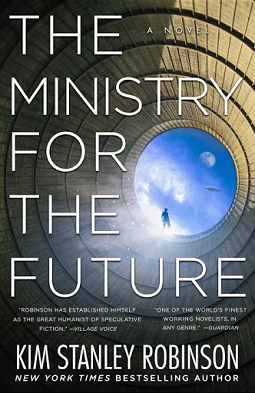
We're Cooked
I’ve always been a fan of science fiction. As a political scientist, science fiction is a very useful way of thinking about the relationship of technology to politics. I don’t like science fiction stories set in futures thousands of years away full of alien civilizations and biologically altered human beings. The best fiction in my view is set in a nearer term future in which a limited number of present-day technological constraints are loosened, allowing the author to explore how that change alters a world in which most of the parameters remain similar to our own.
Science fiction is a domain in which we can play out our hopes, like escaping earth and populating other planets, or our deepest fears. The early 20th century saw two classic works of political science fiction, George Orwell’s 1984 and Aldous Huxley’s Brave New World, which were built around information technology (the “telescreen”) and biotechnology (soma and genetic engineering) respectively. The particular nightmare back then was the use of technology for totalitarian purposes of social control, something quite reasonable against the backdrop of rising Stalinism and fascism. Later in the century, the fears reversed: Neal Stephenson’s Snow Crash or The Diamond Age describe worlds in which all central authority has broken down, and individuals thrown back on their own devices to create social order. These fears have been displaced more recently by imagined dystopias built around pandemic disease (like the movie Virus or the legions of zombie flicks), and environmental collapse.
___STEADY_PAYWALL___
In the latter category is Kim Stanley Robinson, whose Mars trilogy has become something of a minor classic in the genre. In this series, Mars is colonized to escape unfolding ecological catastrophe that has overtaken the earth, but environmental concerns are immediately transported to the red planet. The drive for colonization is led by earth-based mining companies that want to exploit Mars’ natural resources. But the humans who land there divide into factions; some want to terraform the planet and make it suitable for large-scale human habitation, while a radical underground wants to keep it unaltered by human contrivance. The third book of the trilogy describes the constitutional process by which these competing stakeholders decide how to govern themselves following a revolutionary war that gives them independence from earth.

Robinson’s most recent book is his 2020 novel The Ministry for the Future, which Barack Obama named as one of his favorite books. The novel begins sometime in the mid-21st century, when global warming has continued largely unabated from the present. It begins with a massive heat wave that kills 20 million people in India in a single week, and ends, somewhat later in the century, in a happy place (spoiler alert) where enough carbon has been sucked out of the atmosphere to not just slow but to reverse global warming. The central character is Mary Murphy, an Irish national who is put in charge of a newly created UN agency informally titled the Ministry for the Future. The book frequently reads not like fiction but like a didactic tract that explains the workings of the monetary system, the COP process, the politics of the African Union, the errors of neo-liberalism, the geography of Switzerland, taxation, and a host of other subjects.
The premise of the novel is that, following the Indian heat wave, the climate crisis has gotten so dangerous and immediate that governments around the world start throwing everything they have into fighting it. The crisis stimulates a shadowy underground movement called the Children of Kali that starts to assassinate executives of fossil fuel companies, blows up refineries, and shoots down airliners for their carbon output. Governments do not wait for international agreement, but on their own launch ambitious geo-engineering projects to do things like increase earth’s albedo or slow the melting of Antarctic glaciers. The most important initiative carried out by Mary Murphy and her Ministry is to convince a group of central bankers to issue unlimited numbers of carbon coins, which in effect pay people to either not produce or sequester carbon. Rather than making money from pumping oil and gas, fossil fuel companies find that they can earn more profits keeping their reserves in the ground. In addition to reversing the climate crisis, these massive interventions permit governments to cap incomes and institute something like universal basic income, so that everyone is protected from the huge economic disruptions that take place.

I suppose that this novel is intended to be a hopeful blueprint for a way out of the climate crisis. Knowing what I do about global politics and human nature, however, The Ministry for the Future left me rather despairing that it will ever be solved. For all of his seeming political sophistication, Robinson posits the most optimistic possible political developments at every turn, developments that enable Russia, China, the United States, Europe, and the developing world to work together cooperatively to solve the problem. For example, the first three countries listed take their aircraft carriers out of military service and use them to support the pumping of groundwater in the Artic. After the heat catastrophe, India gets its act together and acts boldly as a world leader in geo-engineering. The assassinations of corporate executives and the downing of commercial airliners does not lead to repression of the eco-terrorists, but rather convinces people that they should travel by steamship and dirigible instead. They discover that they don’t actually need to get from Zurich to San Francisco in a day, but are much more productive spending several weeks on a ship. The massive economic downturn provoked by the effective withdrawal of liquidity produces global unemployment higher than that of the Great Depression, but it lasts less than a year as central banks create massive amounts of liquidity and are put under the effective control of the people of their respective countries. After being kidnapped and held hostage at one Davos conference, the world’s elites are safely released and agree to climb onboard with the policies demanded by their kidnappers. Five million people spontaneously march on Tiananmen Square and force the Communist Party to work to save the planet instead of prioritizing economic growth. At the same time that they deal with the climate crisis, governments around the world cap wealth and implement something like universal basic income. They do this as they are depopulating millions of square miles of their own territory and allowing it to be reclaimed by native flora and fauna.
All of these outcomes are so ludicrously unrealistic that I am led to suspect the author’s intention is rather different. Is he really trying to show that we cannot possibly get to seriously effective climate policies without resorting to violence and authoritarian practices? Robinson has the strange view that central bankers actually run the world, entirely detached from the societies that appoint and empower them. So it is sufficient to convince a group of perhaps a dozen people to do the right thing, and the crisis will be essentially solved. It is true that central banks are the least democratically accountable of modern institutions, so perhaps he is pointing beyond democracy. This can only happen because, in his book, populations around the world complain a bit, but ultimately acquiesce to the sacrifices and disruptions brought on by a tiny group of technocrats.
The view that the climate crisis cannot be solved by democratic means certainly has adherents. A few years ago I debated a Norwegian professor who argued that authoritarianism was needed in this domain, pointing to the superiority of Chinese policy over that of Western countries. This is of course nonsense: over the next 50 years, China bids fair to be the world’s largest emitter of carbon by far, and continues to build coal-fired power plants around the world. But it is hard to imagine an international structure that will compel them to do otherwise.
Robinson is right that our future depends on some big governance choices we have yet to make, both at national and international levels. I’m afraid, however, that if he’s right about the needed agenda, we’re all cooked.
American Purpose newsletters
Sign up to get our essays and updates—you pick which ones—right in your inbox.
Subscribe






